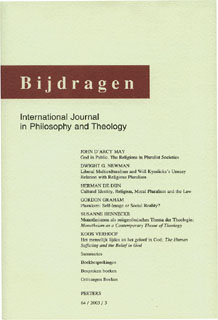 previous article in this issue previous article in this issue | next article in this issue  |

|
Document Details : Title: Die Suche nach sich selbst - Searching for oneself Subtitle: Die Identitätskrise der römisch-katholischen Pfarrei - Identity Crisis of the Roman-Catholic Parish Author(s): SONNBERGER, Klaus Journal: Bijdragen Volume: 59 Issue: 1 Date: 1998 Pages: 75-93 DOI: 10.2143/BIJ.59.1.2002372 Abstract : The Roman-Catholic parishes in The Netherlands are confronted with a number of existential problems. They are short of priests and other professionals needed to manifest their calling of proclaiming the kingdom of God. In addition to this, financial problems and the decline in the number of believers are threatening their subsistence. In reaction to these problems, a lot of dioceses have started reorganizing the structure of their parishes: parishes are assumed to work together. During this process of working together many parishioners are asking themselves what kind of community is formed by their parish. What in fact is the identity of our parish? The identity of the local parish is described in the postvatican theological literature based upon the documents of Vaticanum II. With respect to the ideas of the church as a whole they are worked out in the Vatican documents, theologian, are also looking at the local church as a sacrament or as the people of God. Besides this, the parish has also been described as a diaconal community in the last few decades. At least theologians are trying to formulate the identity of the parish as a combination of context, conviction, vision and mission. These three attempts assume that there is a collective identity of the local church-community. To get an insight into the process of an organization like the parish finding an identity, this article goes back to the concept of identity as formulated by the psychoanalyst Eric Erikson. He describes identity as a result of interaction between group and individual. In this proces, identity acquires a psycho-social quality. Erikson supposes that identity should be understood as an ongoing process which will never will lead to a final and definitive outcome. Looking at the local parish, we find that the process of finding an identity is marked by dynamics, communication ‘ad intra’, communication ‘ad extra’ and by the need for objective opposition. First, dynamics means that a parish can never say that it has found its identity for always and ever. The tradition of the global church, however had tried to do just that. Because of this tradition, parishes are having problems getting into this process of thinking about their own identity. Second, communication ‘ad intra’ means that the identity of a whole community cannot be established if people cannot communicate with each other about this issue. Third, the communication ‘ad extra’, means that parishes have to establish contact with their neighbourhood. Through contact they can find a way to define themselves as a part of the whole neighbourhood for instance. The final element, the objective opposition, means that parishes need a kind of corrective force to be able to find themselves. Former catholics have had common ethics or a common bases of sacramental expressions. This, however has almost completely disappeared. The last part of this article is a reflection on the process of finding an identity in relation to the process of reorganization as pointed out. Reorganization is shown to be a chance for Roman-Catholic parishes to go continue the proces finding themselves. |
